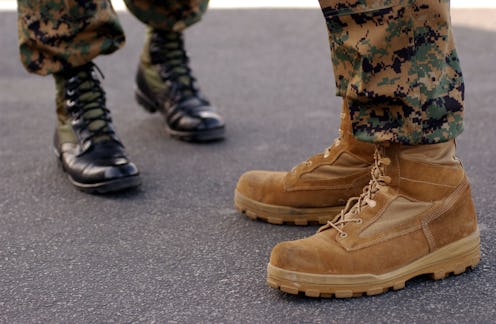News
The Pentagon Will Finally Cover A Soldier's Gender Reassignment Surgery As Health Care

Thousands of soldiers' careers have been up in the air since President Trump first announced a ban on transgender people serving in the military in July, but an October court order temporarily blocking the directive meant trans soldiers can keep their jobs, and trans recruits might be able to enlist in 2018. Although the federal court's ruling does not require the military to pay for medical expenses related to transitioning, an interim Defense Department policy does. And despite the confusion over the past few months, the Pentagon will pay for a transgender soldier's reassignment surgery on Tuesday, the first time it's ever done so.
LGBTQ rights advocates have fought the transgender ban from the beginning and see the move as a step in the right direction. "Regardless of Trump's attempts at enshrining discrimination in policy, we must ensure that transgender troops are treated the same as everyone else," says Human Rights Campaign national press secretary Sarah McBride. "That includes equal access to medically-necessary care."
Pentagon spokeswoman Dana White confirmed in a statement that an unnamed active-duty military member's surgery would be covered. The surgery was done in a private hospital on Tuesday since "military hospitals do not have the surgical expertise to perform this type of surgery," according to the statement shared on Twitter by BuzzFeed News' Jon Passantino.
"Because this service member had already begun a sex-reassignment course of treatment, and the treating doctor deemed this surgery medically necessary, a waiver was approved by the director of the Defense Health Agency,” White said. “The Supplemental Health Care Program will cover this surgery in accordance with the Department’s interim guidance on transgender Service members.”
Sue Fulton, a board member of SPARTA, tells Bustle the Pentagon is treating the surgery as the medical decision it is. "The fact is, the Army pays for all medically necessary care as determined by the soldier’s health care practitioners," she says. "Determining what procedures that a service member needs should be a medical decision, not a political one, and that’s how the Army is treating it."
The decision is in direct conflict with President Trump's comments on transgender people serving in the military. Over the summer, he tweeted that "the United States Government will not accept or allow transgender individuals to serve in any capacity in the U.S. military." He added: "Our military must be focused on decisive and overwhelming victory and cannot be burdened with the tremendous medical costs and disruption that transgender in the military would entail."
His posts were followed up by an official order from the White House banning trans people from openly serving, and prohibiting the Pentagon from covering them medical expenses. The president gave Defense Secretary Jim Mattis the authority to decide how to handle trans soldiers already serving, and he issued interim guidelines allowing current trans soldiers to remain in service and re-enlist at least until February 2018.
However, after transgender service members filed a lawsuit challenging the ban, U.S. District Judge Colleen Kollar-Kotelly ruled that the Trump administration hadn't justified why the ban was necessary, temporarily stopping the ban on service and paying for medical costs from going into effect. If the case isn't dismissed, it will eventually go to trial.
When Former Defense Secretary Ash Carter lifted the ban on trans service members in 2016, he gave the Pentagon time to assess how allowing new trans recruits would effect the military's readiness. Secretary Mattis pushed the deadline back another six months in June, a month before Trump proposed banning all trans soldiers. After the latest court ruling, they may be allowed to enlist for the first time beginning in January, but an appeal from the Trump administration could change that.
The Defense Department is the single largest employer of transgender people in America, according to the Human Rights Campaign. Although one of the main arguments posed by supporters of the ban is that transgender soldiers' medical expenses would cost the military, a 2016 study by Rand Corporation found that health care for active duty transgender military members would cost between $2.4 and $8.4 million annually. In the 2014 fiscal year, the military spent $49.3 billion on health care, meaning health care for transgender service members would have been a mere a drop in the bucket.
Tuesday's reassignment surgery covered by the Pentagon signals that — at least under the interim guidelines — the military will cover medical expenses for transgender troops when deemed medically necessary by a doctor.